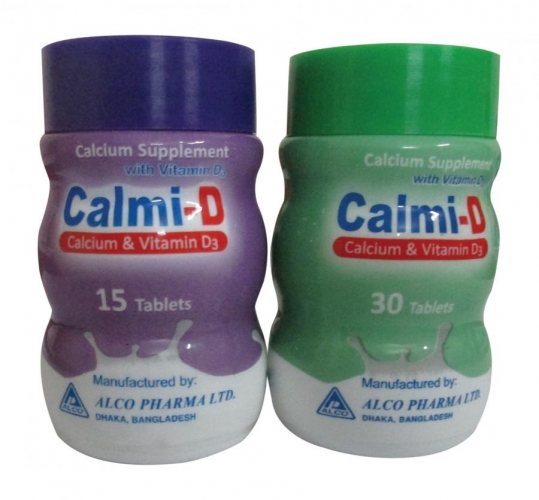ঔষধের বিস্তারিত বা বিকল্প ঔষধ জানতে ঔষধের নাম দিয়ে সার্চ দিন। যেমন- Napa বা Alatrol বা Amodis
Calmi-D 500mg+200IU
TabletCalcium Carbonate [Elemental] + Vitamin D3
Alco Pharma
Other Strength:
Alternative:
- Aristocal D 500mg+200IU
- Calbo-D 500mg+200IU
- Calcium A & D 500mg+200IU
- Ultracal-D 500mg+200IU
- Acical-D 500mg+200IU
- Caldical-D 500mg+200IU
- Reefcal-D 500mg+200IU
- Nutribon 500mg+200IU
- Bonwell-D 500mg+200IU
- Adcal D 500mg+200IU
- Calcibo D 500mg+200IU
- Carben D 500mg+200IU
- Calcin-D 500mg+200IU

Calmi-D
Description:
Calcium is an essential element and plays vital roles in the body. It helps body's framework stronger by building bone. Clinical evidence suggests that calcium is useful for prevention and treatment of osteoporosis and associated fractures. Vitamin-D is also essential for healthy bones as it aids in calcium absorption from the GI tract. In addition to this it stimulates bone formation. Controlled clinical studies shows that calcium and vitamin-D has synergistic effects on bone growth as well as in osteoporosis and fracture prevention.
Composition:
Calmi- D Tablet: Each tablet contains Calcium carbonate USP 1250 mg equivalent to 500 mg of elemental calcium & vitamin D3 BP 200 IU as Cholecalciferol.
Indication/Use:
Treatment of osteoporosis, rickets, osteomalacia, tetany and hypoparathyroidism
In pregnancy & lactation due to increase demand
In kidney disease and pancreatitis
During therapy with antiseizure medications
The prevention and treatment of calcium deficiency/vitamin D deficiency especially in the housebound and institutionalized elderly subjects.
Dosage Guideline:
Adults, elderly and children above 12 years of age: 2 tablets per day, preferably one tablet in the morning and the other in the evening.
Contraindication:
Hypersensitivity to any component of the product. Hypercalcaemia for example, as a result of hyperparathyroidism, vitamin D overdose, decalcifying tumours scuh as myeloma, bone metastases or sarcoidosis. Severe hypercalciuria, renal stones. Osteoporosis due to immobilization.
Drug Interaction:
The risk of hypercalcaemia should be considered in patients taking thiazide diuretics since these drugs can reduce urinary calcium excretion. Hypercalcaemia must be avoided in digitalized patients. Certain foods (e.g. those containing oxalic acid, phosphate or phytinic) may reduce the absorption of calcium. Concomitant treatment with phenytoin or barbiturates can decrease the effect of vitamin D because of metabolic activation. Concomitant use of glucocorticoids can decrease the effect of vitamin D.The effects of digitalis and other cardiac glycosides may be accentuated with the oral administration of calcium combined with vitamin D. Strict medical supervision is needed and, if necessary monitoring of ECG and calcium.Calcium salts may reduce the absorption of thyroxine, biphosphonates, sodium fluoride, quinolone or tetracycline antibiotics or iron. It is advisable to allow a minimum period of four hours before taking the calcium.
Use in Pregnancy & Lactation:
Normal requirements of calcium & vitamin D are raised during pregnancy & lactation. Calcium is excreted in breast milk but not sufficiently to produce adverse effect in the infant. Allowance should be made for vitamin D / calcium for other sources.
Over Dose:
The most serious consequence of acute or chronic overdose is hypercalcaemia due to vitamin D toxicity. Symptoms include nausea, vomiting, polyuria, and constipation. Chronic overdoses can lead to vascular and organ calcification as a result of hypercalcaemia. Treatment should consist of stopping all intake of calcium and vitamin D and rehydration.
Precaution:
Patients with mild to moderate renal failure or mild hypercalciuria should be supervised carefully. Periodic checks of plasma calcium levels and urinary calcium excretion should be made in patients with mild to moderate renal failure or mild hypercalciuria. Urinary calcium excretion should also be measured. In patients with a history of renal stones urinary calcium excretion should be measured to exclude hypercalciuria. With long-term treatment it is advisable to monitor serum and urinary calcium levels and kidney function, and reduce or stop treatment temporarily if urinary calcium exceeds 7.5mmol/24 hours. Allowances should be made for calcium and vitamin D supplements from other sources.
Therapeutic Class:
Vitamin & Minerals
Dosage Form:
Tablet
Storage:
Store in a cool and dry place, protected from light.
এই পাতাটি ২৬৩ বার দেখা হয়েছে
রাজডক কী?
ফ্রী সদস্য হোন Click Here
ডাক্তার হিসাবে যোগদান করতে Click Here
নার্স / টেকনোলজিস্ট হিসাবে যোগদান করতে Click Here
ফ্রী সদস্য হোন Click Here
ডাক্তার হিসাবে যোগদান করতে Click Here
নার্স / টেকনোলজিস্ট হিসাবে যোগদান করতে Click Here

